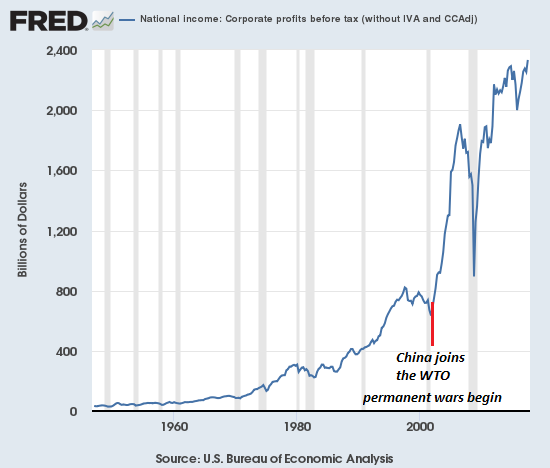Summary:
As for Iraq, the implicit gain was supposed to be access to Iraqi oil. Setting aside the 12 years of "no fly zone" air combat operations above Iraq from 1991 to 2003, the U.S. has been at war for almost 17 years in Afghanistan and 15 years in Iraq. (If the word "war" is too upsetting, then substitute "continuing combat operations".) Since the burdens and costs of these combat operations are borne solely by the volunteers of the U.S. Armed Forces, the American populace pays little to no attention to the wars unless a household has a family member in uniform who is in theatre. Permanent combat operations are now a barely audible background noise in America, something we've habituated to: the human costs are
Topics:
Charles Hugh Smith considers the following as important: Featured, newslettersent, The United States
This could be interesting, too:
As for Iraq, the implicit gain was supposed to be access to Iraqi oil. Setting aside the 12 years of "no fly zone" air combat operations above Iraq from 1991 to 2003, the U.S. has been at war for almost 17 years in Afghanistan and 15 years in Iraq. (If the word "war" is too upsetting, then substitute "continuing combat operations".) Since the burdens and costs of these combat operations are borne solely by the volunteers of the U.S. Armed Forces, the American populace pays little to no attention to the wars unless a household has a family member in uniform who is in theatre. Permanent combat operations are now a barely audible background noise in America, something we've habituated to: the human costs are
Topics:
Charles Hugh Smith considers the following as important: Featured, newslettersent, The United States
This could be interesting, too:
Nachrichten Ticker - www.finanzen.ch writes Die Performance der Kryptowährungen in KW 9: Das hat sich bei Bitcoin, Ether & Co. getan
Nachrichten Ticker - www.finanzen.ch writes Wer verbirgt sich hinter der Ethereum-Technologie?
Marc Chandler writes March 2025 Monthly
Mark Thornton writes Is Amazon a Union-Busting Leviathan?
As for Iraq, the implicit gain was supposed to be access to Iraqi oil.
Setting aside the 12 years of "no fly zone" air combat operations above Iraq from 1991 to 2003, the U.S. has been at war for almost 17 years in Afghanistan and 15 years in Iraq. (If the word "war" is too upsetting, then substitute "continuing combat operations".)
Since the burdens and costs of these combat operations are borne solely by the volunteers of the U.S. Armed Forces, the American populace pays little to no attention to the wars unless a household has a family member in uniform who is in theatre.
Permanent combat operations are now a barely audible background noise in America, something we've habituated to: the human costs are invisible to the vast majority of residents, and the financial costs are buried in the ever-expanding mountain of national debt. What's another borrowed trillion dollars on top of the $21 trillion pile?
But a nation continually waging war should ask: to whose benefit? (cui bono) As near as I can make out, the nation has received near-zero benefit from combat operations in Afghanistan, one of the most corrupt nations on Earth where most of the billions of dollars "invested" have been squandered or stolen by the kleptocrats the U.S. has supported.
What did the nation gain for the tragic loss of lives and crippling wounds suffered by our personnel and Afghan civilians?
As for Iraq, the implicit gain was supposed to be access to Iraqi oil. As near as I can make out, the U.S. imports about 600,000 barrels of oil per day from Iraq, a relatively modest percentage of our total oil consumption of 19.7 million barrels a day.
(Note that the U.S. was importing around 700,000 barrels a day from Iraq before Operation Iraqi Freedom was launched in March 2003--and imports from Iraq declined as a result of the war. So what was the energy-security gain from launching the war?)
Meanwhile, Iraq exports over 2 million barrels a day to China and India, where the presumed benefit to the U.S. is that U.S. corporations can continue to produce shoddy goods using low-cost Asian labor that are exported to U.S. consumers, thereby enabling U.S. corporations to reap $2.3 trillion in profits every year.
(Before China joined the World Trade Organization (WTO), U.S. corporate profits were around $700 billion--less than one-third the current gargantuan sum. Isn't this suggestive of the immense profits gained by offshoring production to Asia and reducing the quality of the goods being manufactured?)
[SmithBook]
Tags: Featured,newslettersent

